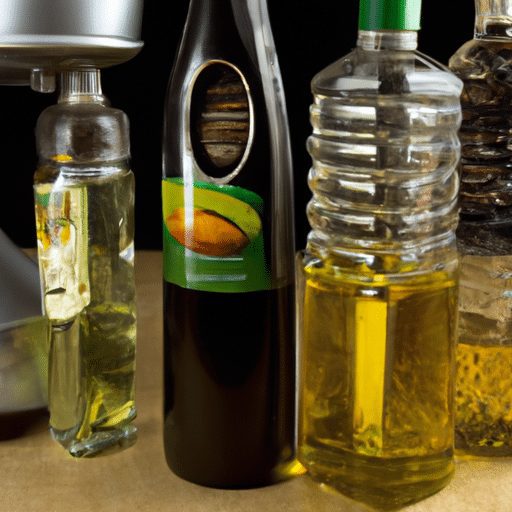In the world of air frying, the question of which oil is best to use often leaves us pondering over our choices. With a myriad of options to consider, from olive oil to vegetable oil, it’s important to understand the impact each oil can have on the crispy perfection we long to achieve. Join us as we explore the qualities and benefits of various oils, uncovering the ideal choice for air frying enthusiasts everywhere. Get ready to embark on a flavorful journey filled with sizzling possibilities!
Types of Oils for Air Frying
When it comes to air frying, choosing the right oil is crucial for achieving the desired results. Different oils have different smoke points, health considerations, flavor profiles, costs, and availability. In this comprehensive article, we will discuss the various types of oils suitable for air frying and provide valuable information to help you make an informed decision.
Smoke Point of Oils
Definition of Smoke Point
The smoke point of an oil refers to the temperature at which it begins to break down and produce smoke. When oil reaches its smoke point, the flavor and nutritional quality can be compromised, and it may even become toxic. Therefore, it’s essential to choose oils with smoke points that can withstand the high temperatures required for air frying.
Importance of Smoke Point in Air Frying
In air frying, the cooking process involves circulating hot air around the food, creating a crispy texture. Since air frying requires high temperatures, selecting oils with high smoke points is crucial to prevent smoke and ensure safe and delicious results.
Oils with High Smoke Point
Some oils that are known for their high smoke points include avocado oil, canola oil, grapeseed oil, and safflower oil. These oils can withstand the high temperatures of air frying without breaking down, making them ideal choices for this cooking method.
Oils with Low Smoke Point
On the other hand, oils with low smoke points, such as extra virgin olive oil and sesame oil, are better suited for low-temperature cooking methods, as they can easily reach their smoke point and become unsuitable for air frying. However, they can still be used for flavoring or drizzling onto cooked air-fried dishes.
Health Considerations
When it comes to our health, it’s essential to choose oils that are beneficial and promote overall well-being. Here are a few health factors to consider when selecting oils for air frying.
Saturated Fats
Saturated fats are commonly found in animal products and some plant-based oils. Consuming excessive amounts of saturated fats can raise cholesterol levels and increase the risk of cardiovascular diseases. When selecting oils for air frying, it’s best to choose options low in saturated fats.
Trans Fats
Trans fats are artificially created fats that can be found in processed foods and partially hydrogenated oils. They are known to be highly unhealthy and increase the risk of heart diseases. It is crucial to avoid oils that contain trans fats and opt for healthier alternatives.
Monounsaturated Fats
Monounsaturated fats, found in oils like olive oil and avocado oil, are considered heart-healthy fats. These fats help reduce bad cholesterol levels and provide essential nutrients to the body. Using oils high in monounsaturated fats for air frying can be a healthier choice.
Polyunsaturated Fats
Polyunsaturated fats, found in oils like sunflower oil and soybean oil, are also considered beneficial for heart health. These fats contain essential omega-3 and omega-6 fatty acids, which play a vital role in maintaining overall wellness. Including oils rich in polyunsaturated fats in your air frying routine can be advantageous.
Omega-3 and Omega-6 Fatty Acids
Omega-3 and omega-6 fatty acids are essential fats that our bodies cannot produce and must be obtained from food sources. These fatty acids have numerous health benefits, including reducing inflammation, supporting brain function, and promoting healthy skin. Oils like canola oil, flaxseed oil, and fish oil are excellent sources of omega-3 and omega-6 fatty acids.
Vitamin E Content
Vitamin E is a powerful antioxidant that helps protect our cells from damage caused by free radicals. Some oils, such as wheat germ oil and sunflower oil, are rich in vitamin E, making them a beneficial addition to our air frying oil options.
Impact on Cholesterol Levels
Choosing oils that have a favorable impact on cholesterol levels is crucial for maintaining a healthy heart. Opting for oils that can lower bad cholesterol (LDL) levels, such as olive oil and canola oil, can be a good choice for air frying.
Flavor Profile
The flavor profile of an oil can significantly impact the taste of air-fried dishes. It’s important to consider the flavor of the oil and how it complements the flavors of the food being cooked.
Neutral Flavored Oils
Neutral flavored oils, such as canola oil and avocado oil, have a mild taste that doesn’t overpower the natural flavors of the ingredients. These oils are versatile and can be used for a wide range of dishes without altering their taste significantly.
Strong Flavored Oils
Some oils, like sesame oil and coconut oil, have distinct and robust flavors that can enhance specific dishes. While these oils may not be suitable for every recipe, they can add a unique and delicious twist to your air-fried creations.
Considering the Dish
When choosing an oil for air frying, it’s essential to consider the dish you’ll be preparing. While some recipes may benefit from the natural flavors of oils like olive oil or coconut oil, others may require a more neutral-tasting oil to let the other ingredients shine. Taking the dish into account when selecting an oil will help ensure a harmonious flavor profile.
Cost
The cost of oils can vary depending on several factors, such as the quality, brand, and availability of the oil. Understanding the cost implications of using different oils for air frying is essential for budget-conscious individuals.
Comparing Oil Prices
When comparing oil prices, it’s important to consider factors such as the size of the bottle, the quality of the oil, and any additional processing that may drive up the cost. Some oils may be more expensive due to their production methods or rarity, while others may be more affordable and readily available.
Long-Term Cost Considerations
While some oils may have a higher upfront cost, they may also have a higher smoke point or health benefits, allowing you to use them for a longer duration. Considering the long-term cost implications of using different oils can help you make a sound financial decision and find the right balance between quality and affordability.
Availability
The availability of oils can vary depending on geographical location and local markets. While some oils may be commonly available, others may be more challenging to find or may need to be sourced from specialty stores.
Commonly Available Oils
Certain oils, such as canola oil, vegetable oil, and olive oil, are widely available and can be found in most grocery stores. These oils are popular choices for air frying due to their accessibility and versatility.
Specialty Oils
Specialty oils, such as avocado oil, grapeseed oil, and walnut oil, may not be as readily available in all areas. These oils often provide unique flavors and health benefits, making them a desirable option for those willing to explore and seek out specialty ingredients.
Local Market Availability
The availability of specific oils may depend on your local market and the demand for certain products. Exploring local stores, farmers’ markets, or online retailers can expand your oil options and provide you with a wider range of choices for air frying.
Best Oils for Air Frying
While the best oil for air frying may vary depending on individual preferences and dietary requirements, here are some top contenders that are commonly recommended:
Avocado Oil
Avocado oil has a high smoke point, making it ideal for air frying at higher temperatures. It has a mild and slightly fruity flavor, making it versatile for various dishes.
Canola Oil
Canola oil is a popular and affordable option for air frying. It has a high smoke point and a neutral flavor, allowing the natural flavors of the food to shine through.
Coconut Oil
Coconut oil has a distinctive flavor that can add a tropical twist to air-fried dishes. It has a medium smoke point, so it’s best suited for lower-temperature air frying.
Grapeseed Oil
Grapeseed oil is rich in polyunsaturated fats and has a high smoke point, making it suitable for air frying. It has a light and neutral flavor that won’t overpower the taste of the food.
Olive Oil
Extra virgin olive oil has a lower smoke point, but it can still be used for air frying at moderate temperatures. It imparts a delightful flavor to dishes, particularly those with Mediterranean or Italian influences.
Peanut Oil
Peanut oil has a high smoke point and a nutty flavor, which can add depth to air-fried dishes. It’s a popular choice for Asian-inspired recipes.
Safflower Oil
Safflower oil is another oil with a high smoke point and a neutral flavor. It’s a versatile oil suitable for a range of air-fried recipes.
Sunflower Oil
Sunflower oil has a high smoke point and a mild flavor, making it an excellent option for air frying. It works well with a variety of dishes without overpowering the flavors.
Using Oil Sprays for Air Frying
Oil sprays can be a convenient alternative to pouring oil directly onto food when air frying. Here are some benefits and considerations when using oil sprays.
Benefits of Oil Sprays
Oil sprays provide an even and controlled distribution of oil, minimizing the risk of using too much oil. They can help achieve a crispy texture while reducing the overall calorie and fat content of the dish.
Choosing a Reliable Oil Spray
When selecting an oil spray, it’s important to choose a high-quality product with no additives or propellants. Look for sprays that use pure oil and consider opting for an aerosol-free option for a more eco-friendly choice.
Proper Application Techniques
To ensure proper coverage, hold the spray nozzle about 6 inches away from the food and apply a light and even coating. Avoid overspraying, as this can result in excessive oil and potentially affect the texture of the air-fried food.
Oil Maintenance for Air Frying
Proper maintenance of your air frying oil can help ensure optimal performance and prolong its usability. Here are some tips for maintaining your oil.
Straining and Filtering Used Oil
After each use, it’s recommended to strain and filter the used oil to remove any food particles or debris. This helps maintain the oil’s quality and prevents potential contamination.
Reusing Oil
Depending on the type of oil and the foods cooked in it, you may be able to reuse the oil multiple times. When reusing oil, make sure to strain it thoroughly and store it in a clean, airtight container. It’s important to monitor the oil for signs of degradation or spoilage and discard it when necessary.
Discarding Oil
If your oil has developed a rancid smell, unusual color, or a heavy amount of sediment, it’s time to discard it. Using degraded or spoiled oil can negatively affect the taste and quality of your air-fried dishes.
Cleaning and Maintaining the Air Fryer
Regularly cleaning your air fryer helps prevent the buildup of oil residue and maintain its performance. Follow the manufacturer’s instructions for cleaning and ensure all parts are thoroughly dried before reassembling the appliance.
Conclusion
When it comes to air frying, choosing the right oil is essential for achieving optimal results in terms of taste, texture, and health considerations. Consider factors such as smoke point, health benefits, flavor profile, cost, and availability when selecting oils for air frying. By understanding these factors and experimenting with different oils, you can find the perfect balance to enhance your air-fried creations while promoting a healthy lifestyle. So go ahead and explore the world of oils for air frying, and enjoy the delightful dishes you can create with them!





































